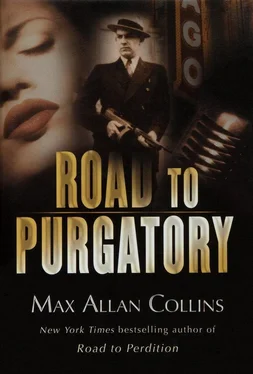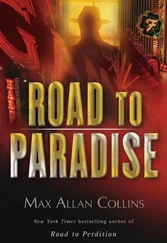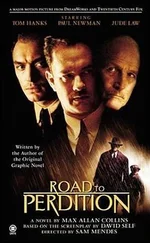Looney merely used the naked truth culled from the lives of these hypocrites to sway them to do his bidding, from paying him off for not running a story to cutting him in for a piece of their action. That was how he’d built his empire: bootleggers, gamblers, and whoremongers had a choice of exposure in the News or taking on a new partner. Right now, John Looney had over one hundred and fifty such partners, who paid him on average four hundred dollars a week in tribute.
“There can be no question that the mayor is feeling the heat,” Looney said. “Which is the other piece of news I have for you — I’m meeting with Mayor Schriver in less than an hour. At his invitation.”
Connor frowned, and Emeal Davis exchanged worried glances with O’Sullivan.
Davis said, “You could be walking into something, Mr. Looney.”
O’Sullivan, sitting forward, asked, “Where is the meeting to be held?”
“Oh, we’re quite safe,” Looney said, with a dismissive wave. “City hall! Right out in the open. Above board.”
Connor said, “What are you meeting with that clown for, anyway? If you’ve decided to run for mayor, already.”
“If the mayor can convince me he is ready to change his ways,” Looney said to his son, “to cooperate with my various requests, to go back to our old arrangements... I will consider taking myself out of the recall equation.”
Davis was nodding. “That sounds reasonable.”
“Emeal, Mike,” Looney said, “I want you to accompany me. Connor, we have dozens of boyos in that Market Square crowd. You circulate. Make sure they do their jobs.”
“You can count on me, Pop.”
Looney stood, motioned with outspread hands, palms up, that the meeting was over.
Connor turned to Helen, and Looney overheard his son say to her, “After the rally, how about I stop by?”
She touched his cheek. “Not tonight, sweetie. Another time.”
And the black-satin madam and her mink coat swished by.
Looney went to his son. “What was that?”
Connor’s eyes went wide with feigned innocence. “What do you mean, Pop?”
“I told you to lay off that...” He turned to make sure Helen Van Dale was gone, but finished in a whisper. “...flesh peddler. You find yourself a nice girl.”
“I’m just havin’ fun. I’m young, yet.”
“You’ll grow old fast, hanging around with whores. You want to catch something?”
Connor frowned, and nodded toward the other side of the room, and O’Sullivan and Emeal Davis, whose proximity meant they could not have avoided hearing the exchange. The father had unintentionally embarrassed his son.
Looney smiled at Connor. “Ah, I’m just an old woman. You’re right, my boy, you’re young... Have a good time. Sow your wild oats.”
Connor grinned. “Thanks, Pop.”
The father raised a forefinger. “ After you do your work at the rally.”
“Right.”
Looney patted his offspring on the cheek. “Good boy.”
Then the mob kingpin gathered his two most trusted men, neither of which was his son, and headed out for a meeting with Mayor Schriver.
Market Square, actually a triangle, was the center of rural commerce in this part of Illinois. An open area of hard-packed earth at Seventeenth Street, from Second to Third Avenues, here farmers could sell corn, potatoes, and hay, among other produce, the railroad station only a block away, making shipping a snap.
The rowdy buildings surrounding Market Square housed first-floor restaurants, saloons, and retailers, with upper-floor hotels for farmers and other transients; on the Seventeenth Street and Third Avenue corner stood John Looney’s Sherman Hotel, whose Java House was a wide-open speakeasy and whose upper floors were the bailiwick of madam Helen Van Dale.
At the opposite end of the same block, the stodgy four-story brick Argus newspaper building seemed to avert its many-windowed gaze from the indecency surrounding it; this competitor of the News had made a crusade out of bringing down publisher Looney, who regularly responded to charges with his own assertions of the rival editor’s supposed sojourns at an insane asylum.
At the center of the square squatted an ornate turn-of-the-century pump house with archways and a speaker’s platform bearing built-in electric illumination under a gingerbread roof. On this clear, not terribly cold March evening, streetlamps joined with the glow of the speaker’s platform to provide plenty of light for the several thousand people, primarily men, who had gathered to hear speakers demand the recall of Mayor Schriver.
The first speaker, Harry McCaskrin, a stocky mustached fellow in bowler and topcoat, had a mild appearance but shook his fists in the air, spouting gloriously invective oratory as he railed against the corruption of the mayor’s office, along the way praising the efforts of the editor of the News .
“Without the endeavors of John Looney,” McCaskrin said, nostrils wide, “Rock Island would be a Midwestern Gomorrah!”
Only half-listening to this as he threaded through the receptive crowd of mostly working-class joes in their caps and coats and heavy work shoes, Connor Looney — in a tan camel’s hair topcoat and green Stetson fedora that a month’s pay from any of these hicks wouldn’t cover — smiled, well aware that everything the mayor was being accused of, Connor’s father could match sin for sin.
Cheers and applause met McCaskrin’s attacks, and fliers demanding the mayor’s recall were circulated by Looney’s news boys, some “boys” as old as Connor. The body odor of these lowlifes got to him after a while, and he paused in his efforts — looking for the Looney shills in the crowd, to encourage them on — to have a smoke on the edges of this madness. Leaning against a feedstore window, he watched as McCaskrin bellowed — these orators could really work up a head of steam — and reflected on the brief conversation between his pop and himself, right before Connor headed over here.
Did the Old Man really think Connor could find an over-the-hill floozie like Helen Van Dale attractive? Sure, by some men’s standards, the Van Dale dame still had it; a shape, a nice face, a sassy manner that a guy might go for.
Personally, Connor found it repellent to be with a woman older than himself, and was repulsed by the idea of being with a woman who’d borne a child. To him, only the budding beauties of the early teenage years really appealed. He was no pervert: he wouldn’t be with a girl under, say, twelve.
That was about right, he thought, just as they were becoming women — flat chests, round little bottoms, innocent faces, tiny flappers in the making. Such living dolls were his passion; were, in fact, the only females he could achieve excitement over.
Helen Van Dale knew that, and she kept her eye out for him, when a new young thing came on the market. She saved such morsels for Connor, and she never charged him a dime — out of respect. Connor realized Helen knew which side of the bread the butter went on: that he would one day be the boss of the Tri-Cities, and she had best keep him happy.
And he would rule from Looney’s Roost one day, though it galled him to see his father cater to that underling, Mike O’Sullivan. No question Mike was a good guy and a real top hand with a gun. But the man was Shanty Irish trash, and Connor was blood.
Sometimes he just couldn’t figure his pop — bad enough Mike had been invited to sit at the conference table in the library; must his pop treat that nigger Davis like an equal? Connor understood the coloreds were good customers, and he knew, too, the likes of Davis had connections that were useful.
But his father let that nigger drive for him — was seen in public with him! And the one time Connor had found the nerve to complain about it to the Old Man, a slap had been his reward. That’s what he got, for showing an interest in the family business! The Old Man talked about wanting Connor to be more involved, to think, to express ideas, and then when he did? A fucking slap, like Connor was some whore!
Читать дальше












